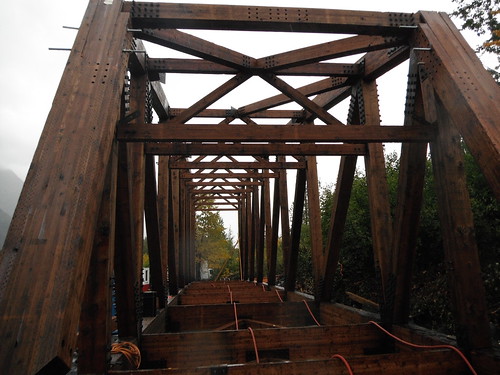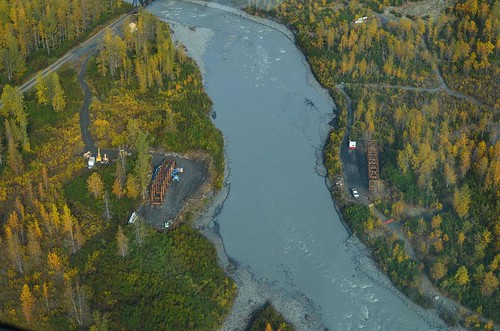
A construction project will literally bridge the gap between dreams and real-world adventure on the Chugach National Forest.
By mid-summer, a 280-foot timber-truss pedestrian bridge will carry visitors over the Placer River as part of a plan to provide access to the Kenai Peninsula’s remote backcountry. The bridge is on the trail near the Spencer Whistle Stop, the first of five train stops planned as part of the Whistle Stop Project that combines rail and trail access on the Chugach.
Construction on the longest single-span, timber-truss bridge in North America began in July 2011 before weather conditions halted the project for the winter. The bridge was manufactured and assembled in Oregon prior to being disassembled, packaged, and shipped to Alaska. Once the bridge was on site, workers reassembled the pieces. Two, fully assembled 112-foot bridge sections now sit on each side of the river waiting to be lifted into their final positions and connected by the 56-foot middle span.

With the spring thaw, construction will soon resume on the pedestrian bridge, the first step in connecting Spencer with future Whistle Stops. Work is nearly complete on the Grandview Whistle Stop, the second stop about nine miles south of Spencer. There, visitors will find sweeping views of a lush alpine valley and glaciers.
The bridge and the Grandview Whistle Stop are set for completion by mid-July.
The projects are part of a long-term partnership between the Forest Service and the Alaska Railroad Corp. to develop new recreation opportunities for people of all ability levels between the Portage Valley and Moose Pass. Visitors will be able to ride the Chugach Explorer, a specially designed train, to each stop and then connect to the trail systems that offer spectacular views of lakes and glaciers, overnight camping opportunities and backcountry rental cabins.

From the Spencer Whistle Stop visitors can enjoy a guided 1.3-mile hike near Spencer Lake and Spencer Glacier with a Forest Service interpreter or instead take a guided rafting or glacier exploration provided by permitted outfitters. The area is also open to unguided and overnight use.
The whistle stops will include information pavilions and restrooms and give visitors the opportunity to experience areas of the forest previously difficult to access. American Recovery and Reinvestment Act funds are financing the current construction phase of the project which will help create new business opportunities for outfitters and guides, the Alaska Railroad, and local communities.

